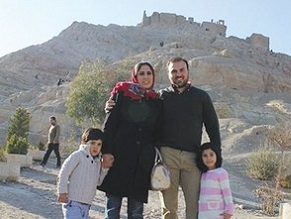|
World Jewish News

American-Iranian Pastor Saeed Abedini with family Photo: Courtesy ACLJ
|
US team slams Iran's ‘heightened anti-Semitism'
06.05.2013, Anti-Semitism The most egregious governmental violators of religious liberty include Iran, for its state-sponsored anti- Semitism, the US Commission on International Religious Freedom said in its 2013 report issued last week.
The bipartisan Washington- based commission cited eight “countries of particular concern,” because of their “governments’ perpetration or toleration of systematic, ongoing, egregious religious freedom violations: Burma, China, Eritrea, Iran, North Korea, Saudi Arabia, Sudan and Uzbekistan.”
“Iran is a constitutional, theocratic republic that discriminates against its citizens on the basis of religion or belief. During the past year, the already poor religious freedom conditions continued to deteriorate, especially for religious minorities, in particular for Baha’is as well as Christians and Sufi Muslims,” the report said.
The document covered the period January 31, 2012 – January 31, 2013.
The commission took the Islamic Republic to task for widespread human rights violations.
“Heightened anti-Semitism and repeated Holocaust denials by senior government officials and clerics continue to foster a climate of fear among Iran’s Jewish community. Since the 1979 revolution, members of minority religious communities have fled Iran in significant numbers for fear of persecution.”
The report continued, “Physical attacks, harassment, detention, arrests and imprisonment intensified.
Even some of the recognized non-Muslim religious minorities protected under Iran’s constitution – Jews, Armenian and Assyrian Christians, and Zoroastrians – face harassment, intimidation, discrimination, arrests and imprisonment.”
The authors urged the US government to “continue to identify specific Iranian officials – including Supreme Leader Ayatollah Ali Khamenei and President Mahmoud Ahmadinejad – and entities responsible for severe human rights and religious freedom violations and impose travel bans and asset freezes on those individuals, while continuing to work with its European and other allies to do the same.
USCIRF urges the US government to continue to speak out vigorously, including in formal or informal bilateral or multilateral fora, about deteriorating human rights and religious freedom conditions, and to demand the release of all prisoners of conscience.”
The case of the imprisoned American-Iranian Pastor Saeed Abedini was cited in the report. Iran’s judiciary sentenced Abedini to eight years in prison for practicing Christianity. The American Center for Law and Justice, which represent Abedni’s family in the US, quoted his wife, Naghmeh, on its website:
“Saeed has internal bleeding and now issues with his kidneys because of the beatings. We believe that he is being beaten in solitary confinement. We have no way of finding out about his health. There will be no more visitations allowed and we will have no way of knowing how Saeed is doing. Saeed had previously told his family that when he was in solitary confinement in the past, that was the hardest time in his life. That every hour was like one year and that he was losing his memory and his health was deteriorating quickly. Please pray for his health and healing. Pray for his release.”
In his article titled “Fear for Religious Freedom” on the website of Foreign Policy last week, Dwight Bashir, the commission’s deputy director of policy, wrote, “In the fall of 2012, three mothers, along with their infant children, begin serving one-totwo- year prison terms in Iran. Their crime? Being Baha’is in the birthplace of their faith.”
He noted, “May 14 marks the five-year anniversary of the imprisonment of seven Baha’i leaders, the longestserving prisoners of conscience in the country. More than 100 other Baha’is languish in jail while at least a dozen Christians are in prison for their faith.”
Bashir, a leading international expert on religious freedom, warned, “As elections approach next month [in Iran], there’s a likelihood of increased scapegoating of religious minorities and dissident Shi’ite clerics, since the basis of the government’s repression is survival, on the one hand, and punishing those who dissent, on the other.”
By BENJAMIN WEINTHAL, JERUSALEM POST CORRESPONDENT
JPost.com
|
|
